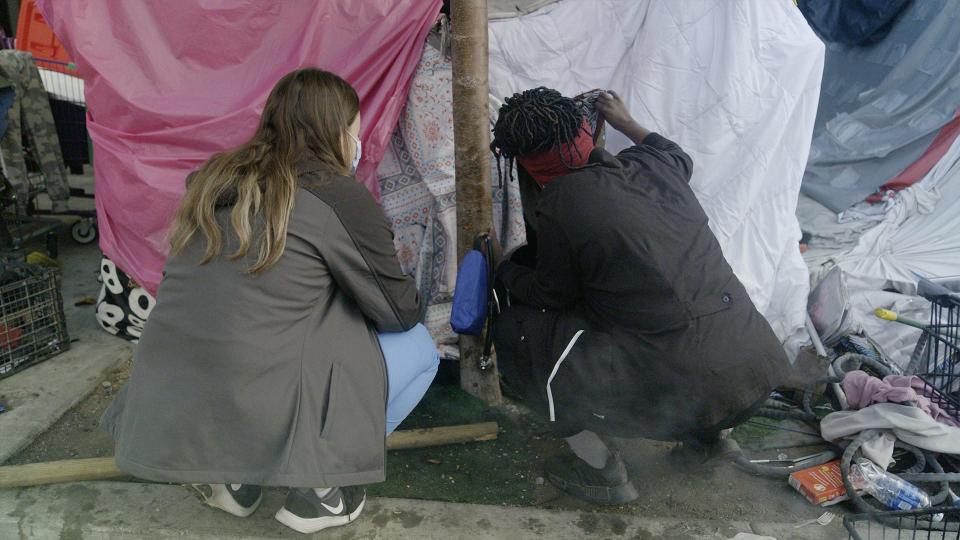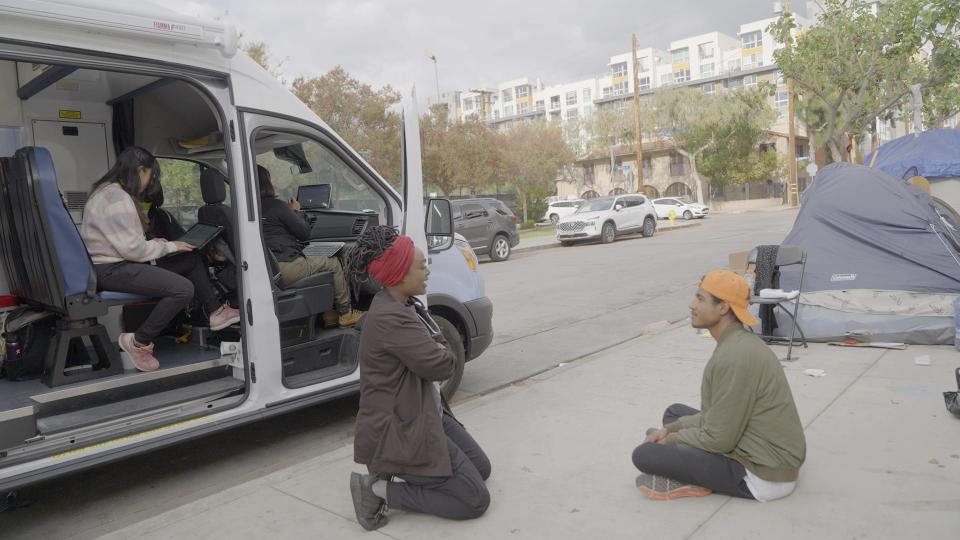L.A.'s state of emergency on homelessness: How a street medicine team is treating patients in a unique way
This story is a collaboration with Humankind, USA TODAY 's good news franchise, for the sixth episode in the series “States of America.” The last names of the individuals sharing their health diagnoses have not been used to protect their medical privacy. The full episode of “States of America” exploring healthcare workers fighting homelessness on the streets of Los Angeles premieres at 8 p.m. and 10 p.m EST on January 13 on USA TODAY NETWORK’s streaming channel. For a full list of platforms offering our FREE streaming channel, follow the link here and catch our full series on YouTube here.
The rising sun usually brings warmth in sunny Los Angeles, but a chill in the air this winter morning sends shivers through anyone stepping outside without a warm coat.
Registered nurse Jessica Jimenez sports an extra layer under her scrubs as she calls out to the closed tents strategically located at Formosa and Romaine, on the border of Hollywood and West Hollywood. The undefined zone means there's less chance that businesses or residents will complain.
"They don't have to worry about being reported or being asked to leave — as frequently," Jimenez says.
She uses her tried-and-true tactic of "good old-fashioned yelling" to wake them up with a necessary but grim freebie: monkeypox vaccines.

There's an outbreak spreading and the homeless population is particularly vulnerable.
It's estimated that nearly 70,000 people experience homelessness every night in Los Angeles county, according to the Los Angeles Homeless Services Authority.
With tents and encampments expanding across the city since the pandemic began, many residents consider homelessness the top issue facing L.A., according to a 2021 USA TODAY/Suffolk University Poll. Patience is wearing thin and frustration is growing at the perceived lack of action from government.
Karen Bass, who was sworn in as L.A.'s mayor in December, declared a state of emergency on homelessness as her first major act in office.
Moving from tent to tent, Jimenez's job right now is to vaccinate as many people as she can without pushing too hard and risking them zipping their shelters closed. It's a constant and delicate balance.
"It can be tough," she said. "Things don't always go the way that you want them to. Individuals might not accept you. They might not follow the plans that you have."
Jimenez is part of Healthcare In Action, a street medicine team caring for patients by trying to meet them where they're at — even if that means inside their tents.
The nurses, doctors, therapist and housing liaison on this team work from an unconventional office: a cargo van. The vehicle has all the equipment they need to take blood samples, treat minor wounds, administer vaccines and perform check-ups. It might not be the easiest to park, but after a year of driving through L.A.'s tight side streets, they're getting used to it.
As Jimenez and PA (physician assistant) Catherine Parsekian manage to inject a few arms, others take notice and get their triceps ready as well. That's kind of how it works out here. If one person trusts you, it's easier to get others to follow. It's a good thing, too. Monkeypox, part of the same viral family as smallpox, causes a painful body rash and flu-like symptoms in most people but it can also cause death.
"When we go to them, it's a lot more humbling and it switches the power dynamic and allows them to let us in because we came to them," said Parsekian.
Kayla, who lives in the encampment, is on the tail-end of her monkeypox infection after contracting it several weeks ago.
The 28-year-old approaches the health care workers in tears. It's been a rough morning. She has a painful blister on the bottom of her foot, making it hard for her to walk to places like her doctor's office. She said her milk is going bad with no fridge to keep it cool. When she's desperate to use the restroom, she has to find a nearby store — one that won't immediately kick her out. Then there's the worry that if she steps away from her tent, her belongings might not be there when she gets back.
Usually taking comfort in her favorite pastime, singing, she appears too deflated for even that.
"Oh my God, nobody helps," said Kayla, whose last name we're withholding to protect her medical privacy. "If I be like, 'Sir, what time is it?' He'll be looking at his phone and be like, 'Oh, I don't know.' He just doesn't want to be bothered with us. No one helps."
Kayla left her home in nearby Downey, California when she says her family didn't accept her as transgender. The number of transgender adults experiencing homelessness has skyrocketed in the U.S. over the last eight years.
Parsekian and Jimenez each give her a hug, not in a rush to let go. On days like this, the health care workers say listening is just as important as the rest of their tasks.

"Those are sometimes the things that make the largest difference," said Jimenez. "People walk by every day. They get heckled. They know how people look at them and just being able to sit through it, it means so much to them. Nobody is doing that. And even if they were to go into a regular clinic, they (staff) don't have time."
From their van, the team can do follow-up work discreetly on conditions that often stigmatize individuals, such as HIV.
Kayla has that, too.
As a result, her immune system is compromised, making her more susceptible to other illnesses.
"What we've seen happen is individuals just kind of go on with these chronic conditions for years and years, and they deteriorate. And especially with HIV, that could lead to a whole host of conditions that are sending individuals back and forth to the ER. It becomes very expensive and it doesn't actually deal with the underlying conditions," says Jimenez.
Jimenez says Kayla's HIV has gone untreated for a long time but her team has finally been able to complete lab tests for her.
"We're going to be starting her on her medication, and because we're able to come to her, we'll be able to monitor her," said Jimenez. "That's one thing that we can take off of her plate."
By returning for weekly, and sometimes daily, visits, Jimenez says people trust them. That trust, she says, is the foundation for helping them eventually get off the street and into housing.

"It took us showing up here for a while before people actually started talking to us," said Jimenez. "We're able to meet them where they are and help them break that down piece by piece so that they feel like they have the capacity and space to be able to work themselves out of their situation."
As we speak outside Kayla's tent, two workers from the Department of Public Health approach the encampment with trepidation. Wearing masks and their official badges, they're trying to encourage those with monkeypox to isolate. They also want some information to help gauge the outbreak as a whole.
No one is coming out of their tents to cooperate.
Jimenez and Parsekian begin asking people by name to answer the Health Department's questions. After all, they say, it's for the good of everyone. Slowly, the zips on the tents open up.
"Because we're out here so often, we've developed a rapport with a lot of these individuals," said Jimenez. They know we're friend and not foe."
Healthcare in Action works on the premise that if you can address underlying contributors to homelessness, such as an individual's mental and physical health, the chance for success at finding stable employment and housing increases significantly.
Using this model, the team says it has helped 50 people get off the streets over the last year.
Operating under the SCAN Group, one of the differences between Healthcare in Action and other nonprofits is the way it's funded. While most tend to rely heavily on charitable donations, Healthcare in Action's funding is diversified. It gets more than half of its revenue from special Medicaid and Medicare billing, and is affiliated with the nonprofit SCAN health plan to help make it all more sustainable.
So far, they say emergency room re-admissions are down 25 per cent at one hospital among the patients they treat.
"Even if all I did that day was give out a meal or a hug, or if our organization is able to house five people, that's five lives completely changed," said Jimenez. "Piece by piece. That's how things get done."
Jimenez says she knows there's "compassion fatigue" from residents who want to see changes to the large number of encampments in the city. She says long-lasting improvements, though, require another ingredient: empathy.
"All of us go through periods of trauma in our life, and usually, there's somebody there to catch us," said Jimenez. "A lot of these individuals, they didn't have that safety net. They didn't have that individual to pull them up."
She added: "We get to be those arms that wrap around them to pull them back up."
Jimenez dresses the wound on Kayla's foot, giving her a pep talk at the same time.
"I probably wouldn't be doing as well as I am right now, if they didn't come into my life," said Kayla. "I don't want to be here. I really don't want to be here ... but it's just going to take a little bit of time."
While Kayla came to the van with watery eyes and smudged mascara, she leaves with her head a little higher.
She struts back toward her tent as if on a runway, wearing a tank top that says Never Give Up. Kayla bursts into full-on Whitney Houston as she puts one foot in front of the other.
Parsekian smiles under her mask, sliding the side door of the van shut. She hops in the driver's seat for the next location.
"It's easy for people to drive by a tent or an encampment and say, 'Those people are good for nothing. They must have deserved what they got,'" said Parsekian.
"This job teaches me every single day that all of our patients were in situations where, how could we not have expected them to get there? They were dealt so many tough hands. It's a miracle they're still here."
It's warming up and she rolls down the window.
Kayla's booming voice can be heard singing Houston's I Have Nothing. The lyrics, "Don't make me close one more door/I don't wanna hurt anymore," carry down the street.
Watch how health care access can help homeless patients get off the streets on the latest episode of States of America, premiering at 8 p.m. and 10 p.m. EST.
This article originally appeared on USA TODAY: Los Angeles health care workers fight homelessness with care

